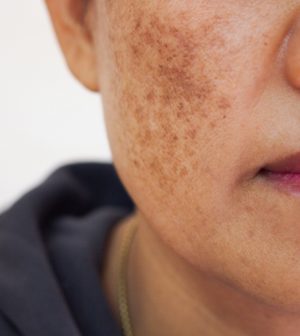- Could Your Grocery Store Meat Be Causing Recurring UTIs?
- Are You Making This Expensive Thermostat Error This Winter?
- Recognizing the Signs of Hypothyroidism
- 10 Strategies to Overcome Insomnia
- Could Artificial Sweeteners Be Aging the Brain Faster?
- Techniques for Soothing Your Nervous System
- Does the Water in Your House Smell Funny? Here’s Why
- Can a Daily Dose of Apple Cider Vinegar Actually Aid Weight Loss?
- 6 Health Beverages That Can Actually Spike Your Blood Sugar
- Treatment Options for Social Anxiety Disorder
Melasma: New Dark Patches or Freckling — A Dermatologist Offers Tips on Dealing With It

Dark patches or freckle-like spots on the face are melasma, and it’s possible both to prevent them and make them less noticeable, according to a skin expert.
Dr. Rebecca Kazin, a Rockville, Md., dermatologist, offers some tips for dealing with these patches, which are caused by sun exposure, pregnancy, stress, certain medications and sometimes a medical condition.
“While melasma may go away on its own, it can persist for years,” Kazin said in a news release from the American Academy of Dermatology. “Although melasma is not harmful, people often want to treat it.”
A dermatologist can create an individualized treatment plan using different therapies to address each patient’s concerns, she said.
Melanocytes, the cells that give skin its color, are more active in darker complexions, so melasma can be more noticeable with darker skin tones.
Kazin and the American Academy of Dermatology recommend protecting the skin from the sun.
Seek shade when outdoors. Wear sun-protective clothing, including a lightweight and long-sleeved shirt, pants, a wide-brimmed hat and sunglasses with UV protection.
Choosing clothing with an ultraviolet protection factor (UPF) number on the label can offer even more protection.
Use a broad-spectrum, water-resistant sunscreen with an SPF of 30 or higher on all skin not covered by clothing whenever you’re outdoors, even on cloudy days.
Reapply sunscreen every two hours, more often if you have been swimming or sweating.
Use tinted sunscreen to protect yourself from the visible light, which has been shown to worsen melasma, especially in people with darker skin tones. Use a tinted sunscreen that contains iron oxides in addition to having an SPF 30 or higher.
Protect your skin from irritation by choosing gentle, fragrance-free skin care and makeup products.
Cover up with makeup. It takes time for melasma treatments to work, so covering uneven skin tone can make your melasma less noticeable if the appearance bothers you. A dermatologist can offer tips.
“Keep in mind that other conditions can also cause an uneven skin tone,” Kazin said. “For an accurate diagnosis, partner with a board-certified dermatologist.”
More information
The U.S. National Library of Medicine has more on melasma.
SOURCE: American Academy of Dermatology, news release, Sept. 12, 2023
Source: HealthDay
Copyright © 2026 HealthDay. All rights reserved.










